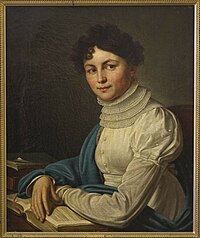| Revision as of 05:06, 6 October 2014 editSer Amantio di Nicolao (talk | contribs)Autopatrolled, Administrators6,293,643 edits add category using AWB← Previous edit | Revision as of 15:46, 15 October 2014 edit undoSer Amantio di Nicolao (talk | contribs)Autopatrolled, Administrators6,293,643 edits →References: add category using AWBNext edit → | ||
| Line 47: | Line 47: | ||
| ] | ] | ||
| ] | ] | ||
| ] | |||
Revision as of 15:46, 15 October 2014
| Anna Bunina | |
|---|---|
 Portrait by Alexander Varnek Portrait by Alexander Varnek | |
| Born | (1774-01-18)January 18, 1774 Urusovo, Lipetsk Oblast |
| Died | December 16, 1829(1829-12-16) (aged 55) Denisovka, Lipetsk Oblast |
Anna Petrovna Bunina (Russian: А́нна Петро́вна Бу́нина, IPA: [ˈannə pʲɪˈtrovnə ˈbunʲɪnə] ; January 18, 1774 – December 16, 1829) was a Russian poet. She was the first female Russian writer to make a living solely from literary work. She is an ancestor of Nobel Prize winner Ivan Bunin.
Biography
Anna was born in the village of Urusovo in Ryazan Governorate (present day Lipetsk Oblast). Her mother died in childbirth. She was raised by various relatives, and received only a rudimentary education. She began writing around the age of 13. She published her first work in 1799.
She moved to St Petersburg in 1802 with the help of a small inheritance from her father, setting up her own home and employing private tutors to further her education. She devoted herself entirely to writing, supporting herself through patronage, subscriptions and sales. She was awarded pensions by the Russian Imperial Family in 1809, 1810 and 1813. From 1807 to 1810 she was a member of the literary circle of Gavrila Derzhavin and Alexander Shishkov, to whom she had been introduced through family connections, and who acted as a mentor. In 1811 she was made an honorary member of the Colloquium of Admirers of Russian Writing, probably the only group of the time that allowed women to be members, although Bunina was only able to join under inferior conditions; she wasn't allowed to present her works in person, or to discuss them with the group. She found her relations with Shishkov and the Colloquium oppressive, but indespensable to her literary career.
Her first work The Inexperienced Muse was published in 1809, followed by a second volume under the same title in 1812. She published a volume entitled Collected Works in 1819. Her works showed a greater thematic, stylistic, and metrical range than those of her female predecessors. Her verse offers original and significant observations on the experiences of women, especially of their conflicts with men. Her poetry was well-received; she became famous and suffered from the satirical attacks of the Colloquium's rivals, most notably the Arzamas Society. Her works were mostly forgotten after her death, partially due to the influence of the Arzamas Society, limiting her influence on future poets.
She travelled to Britain in 1815-17 for treatment of breast cancer, which was unsuccessful. In 1820 she was made an honorary member of the Free Society of Lovers of Russian Literature. She left St Petersburg in 1824 due to illness, and lived with relatives, but continued to be financially independent. She died in Denisovka, Ryazan Governorate, in 1829. She was buried at Urusovo.
English translations
- Though Poverty's No Stain and Conversation Between Me and the Women, (poems), from An Anthology of Russian Women's Writing, Oxford, 1994.
References
- ^ Smith, Bonnie (2008). The Oxford Encyclopedia of Women in World History, Volume 1. Oxford University Press. pp. 265–266. ISBN 0-19-514890-8. Retrieved 2011-11-24.
- ^ Cornwell, Neil; Christian, Nicole (1998). Reference Guide to Russian Literature. Fitzroy Dearborn Publishers. p. 210. ISBN 1-884964-10-9. Retrieved 2011-11-24.